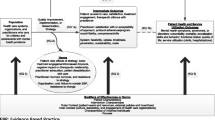Abstract
This article summarizes the major findings of the Fort Bragg Evaluation and considers alternative explanations for the results. The evaluation found that the continuum of care provided a high-quality system of care but was more expensive and produced no better clinical outcomes than traditional services. The possibility of implementation failure at both the systems and services levels is considered and rejected as an explanation for the results. Support for the validity of the measurement, design, and the analysis is also presented. The implications for research and policy are described.
Similar content being viewed by others
References
Rivera VR, Kutash K:Components of a System of Care: What Does the Research Say? Tampa: University of South Florida, Florida Mental Health Institute, Research and Training, Center for Children’s Mental Health, 1994.
Bickman L: Improving established statewide programs: A component theory of evaluation.Evaluation Review 1985; 9:189–208.
Bickman L (Ed.):Using Program Theory in Evaluation. San Francisco: Jossey-Bass, 1987.
Bickman L (Ed.):Advances in Program Theory. San Francisco: Jossey-Bass, 1990.
Chen H:Theory-Driven Evaluations. Newbury Park, CA: Sage, 1990.
Chen H, Rossi PH: Evaluating with sense: The theory driven approach.Evaluation Review 1983; 7 283–302.
Yin RK:Case Study Research. Beverly Hills, CA: Sage, 1986.
Yin RK:Applications of Case Study Research. Newbury Park, CA: Sage, 1993.
Bickman L, Schut J, Karver M, et al.:Empirical Approaches toward Understanding Appropriate Care. Tampa: University of South Florida, Florida Mental Health Institute, Research and Training, Center for Children’s Mental Health, 1995.
Weisz JR, Weiss B:Effects of Psychotherapy with Children and Adolescents. Newbury Park, CA: Sage, 1993.
Joint Commission on Accrediation of Health Care Organizations:Consolidated Standards Manual. Oakbrook, IL: JCAHO, 1991.
Joint Commission on Accreditation of Health Care Organizations:Mental Health Accreditation Mannual. Oakbrook, IL: JCAHO, 1993.
Flannery D: Report of the Review of the Quality Assurance Mechanism, at the Fort Bragg Child and Adolescent Mental Health Demonstration. Unpublished manuscript, U.S. Army Health Services Command, San Antonio, TX.
Hedrick T, Bickman L, Rog D:Planning Applied Social Research. Beverly Hills, CA: Sage, 1983.
Lipsey MW, Crosse S, Dunkle J, et al: Evaluation: The state of the art and the sorry state of the science. In: Cordray DS (Ed.):Utilizing Prior Research in Evaluation Planning: New Directions for Program Evaluation. San Francisco: Jossey-Bass, 1985, pp. 7–28.
Lambert EW: Monte Carlo modeling. In: Bickman L (Ed.): Response to the Directorate of Health Care Studies and Clinical Investigations Final Report (Revised). Unpublished manuscript, Vanderbilt University Center for Mental Health Policy, 1993.
Cook T, Shadish W: Social experiments: Some developments over the past fifteen years.Annual Review of Psychology 1994; 45:545–580.
Costner H: The validity of conclusions in evaluation research: A further development of Chen & Rossi theory-driven approach.Evaluation & Program Planning 1989; 12(4):345–353.
Sussman M, Robertson DU: The validity of validity: An analysis of validation study design.Journal of Applied Psychology 1986; 71(3):461–468
Palumbo DJ, Olivrio A: Implementation theory and the theory-driven approach to validity.Evaluation and Program Planning 1989; 12:337–344.
Burns BJ: Mental health service use by adolescents in the 1970s and 1980s.Journal of the Academy of Child and Adolescent Psychiatry 1991; 30(1):144–150.
Author information
Authors and Affiliations
Additional information
This research was supported by the U.S. Army Health Services Command (DADA 10-89-C-0013) as a subcontract from the North Carolina Department of Human Resources, Division of Mental Health, Developmental Disabilities, and Substance Abuse Services; and a grant to Dr Leonard Bickman (R01MH-46136-01) from the National Institute of Mental Health. This article is part of a special issue that focuses on the Fort Bragg Evaluation. These articles are best understood when read together. The articles are cross-referenced when it is deemed most appropriate.
Rights and permissions
About this article
Cite this article
Bickman, L. Implications of a children’s mental health managed care demonstration evaluation. The Journal of Mental Health Administration 23, 107–117 (1996). https://doi.org/10.1007/BF02518647
Issue Date:
DOI: https://doi.org/10.1007/BF02518647




